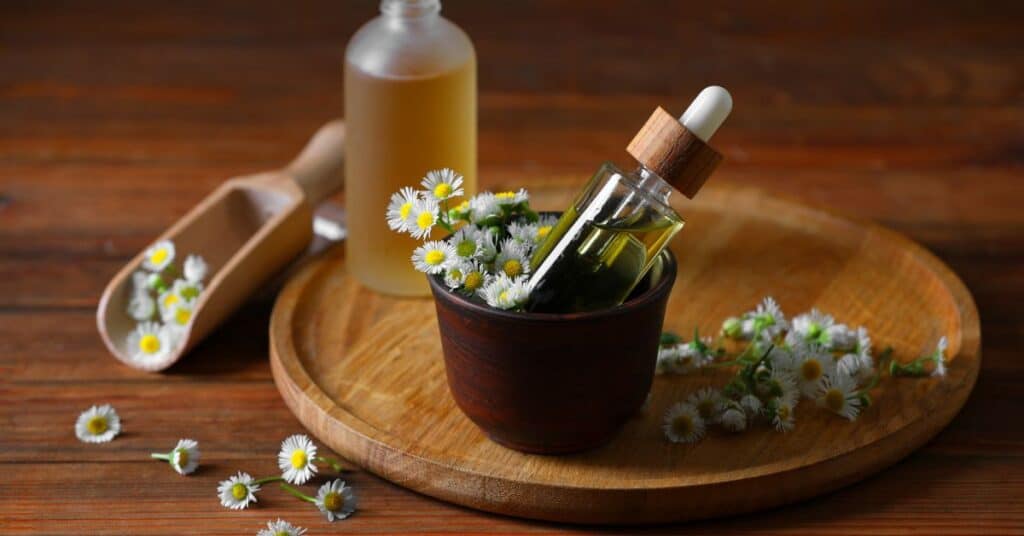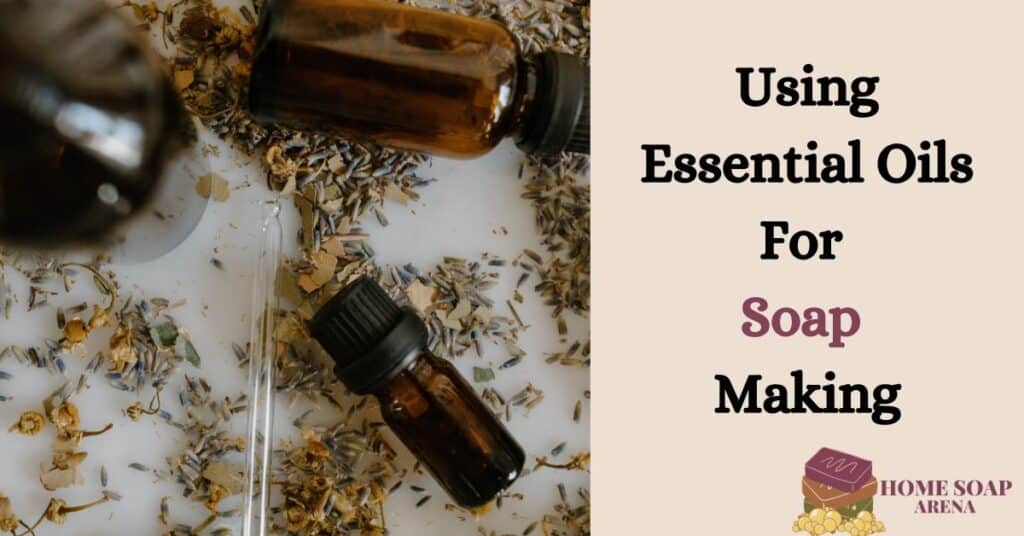What essential oils for pine tar soap? Since pine tar has a strong scent, I love combining it with essential oils that soften or enhance its perfume.
Pine tar soap has been cherished for its potential benefits.
It has a smoky, woodsy, and leathery aroma that some people find appealing and others find unpleasant.
It is believed to aid in soothing skin conditions, such as eczema and psoriasis, making it a go-to for those seeking a natural and holistic skincare approach.
In this blog post, I will show you the essential oils that work well with pine tar soap. How to make pine tar soap.
Let’s Start!
What Essential Oils Go Well With Pine Tar?
Cedarwood: This essential oil has a warm, woody, and balsamic aroma that complements the pine tar.
Cedarwood essential oil seamlessly complements the robust aroma of pine tar.
Its earthy notes add depth, creating a harmonious blend that evokes the essence of the great outdoors.
Beyond its aromatic contribution, cedarwood is known for its grounding properties and ability to ward off insects, enhancing the practicality of pine tar soap.
Lavender: This essential oil has a floral, herbaceous, and soothing aroma that balances the pine tar.
Its soothing properties align with the potential benefits of pine tar soap for the skin.
The combination creates a soap that not only invigorates the senses but also promotes a sense of relaxation.
Bergamot Essential Oil: Citrusy and uplifting
Bergamot essential oil introduces a citrusy brightness to the rich profile of pine tar soap.
Its uplifting aroma adds a touch of positivity to the blend.
Known for its mood-enhancing properties and potential skin-brightening effects, bergamot brings a multifaceted dimension to the soap.
Eucalyptus: This essential oil has a fresh, minty, and camphoraceous aroma contrasting with the pine tar.
Its camphoraceous aroma clears the senses, providing a refreshing and uplifting bathing experience.
Beyond its aromatic appeal, eucalyptus is known for promoting respiratory clarity, offering an additional wellness aspect to the soap.
Juniper Berry Essential Oil: Crispy and slightly sweet
Juniper berry essential oil introduces a touch of sweetness to the aromatic symphony.
Its crisp and slightly sweet notes harmonize with the smokiness of pine tar, creating a balanced fragrance.
Juniper berry is celebrated for its purifying properties, making it a valuable addition to a soap aimed at soothing and refreshing the skin.
Fir Needle Essential Oil: Fresh and evergreen
Fir needle essential oil brings a breath of fresh forest air to pine tar soap.
The combination of fir needle and pine tar creates a refreshing bathing experience reminiscent of a walk through a coniferous forest.
Tea tree: This essential oil has a sharp, medicinal, and earthy aroma that blends well with the pine tar.
It also has antibacterial, antifungal, and anti-inflammatory properties that can help with acne, fungal infections, and wounds.
Patchouli Essential Oil: Earthy and musky
Patchouli essential oil contributes an earthy and musky undertone to the blend. Its grounding properties align well with the nature-inspired fragrance of pine tar soap.
Additionally, patchouli is known for its skin-supportive qualities, making it a valuable inclusion.
You can also use essential oils like orange, peppermint, rosemary, and lemongrass. How to calculate essential oil for soap.
However, in scenting soap, there is always room for experimentation and combining these essential oils, depending on your preference and needs.
Can You Use Pine Essential Oil in Soap?
Yes, balsamic pine essential oil is a fantastic choice for soap-making. Its distinctive, invigorating scent adds a natural and outdoorsy aroma to your soap.
Remember, your pine tar has to be creosote-free because it is skin-safe.
Pine tar essential oil is derived from pine tar, a thick, sticky substance obtained from pine trees’ wood.
The oil is beneficial for widespread dry, red, itchy, and inflamed conditions as it is moisturizing and suitable for bath use.
Additionally, pine essential oil is known for its potential skin-soothing properties, making it a valuable inclusion in skin care products like soap.
What Is Pine Tar Essential Oil Good For?
Skin Support: Pine tar is known for its potential to soothe and support the skin.
Research shows that pine tar has been used for over 2000 years to address skin conditions such as eczema, psoriasis, and minor irritations.
Antimicrobial Properties: Pine tar is believed to possess antimicrobial properties, contributing to its historical use in skincare and as a component in some soaps.
Hair Care: It has many benefits for the hair, such as promoting shiny and healthy hair, reducing dandruff, treating dry scalp, preventing hair loss, and stimulating blood circulation.
It is also a safe and natural alternative to harsh hair and scalp care chemicals.
It’s important to note that individual responses to pine tar can vary, and consulting with a healthcare professional is advisable, especially for those with specific skin concerns or sensitivities.
What Essential Oil Smells Like Pine?
If you’re seeking an alternative to pine essential oil or looking to create a more complex fragrance blend, several essential oils share a similar pine-like aroma, Such as fir needle, juniper berry, spruce, cedarwood, cypress, and frankincense.
These oils have a similar woody, fresh, and slightly sweet aroma that can create a forest-like atmosphere.
Experimenting with these alternatives allows you to tailor the aroma to your preferences while capturing the essence of pine in your soap.
Conclusion
Elevating your pine tar soap with essential oils opens up aromatic possibilities.
You will still benefit from and enjoy pine soap regardless of your taste, whether it is scented or unscented pine soap.
However, pine tar and thoughtfully selected essential oils enhance the fragrance and add therapeutic benefits to your soap-making.



